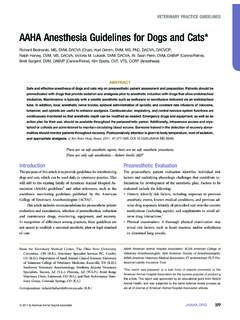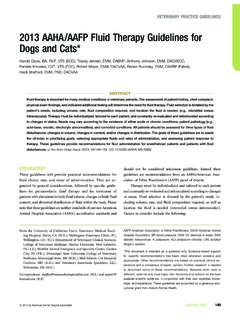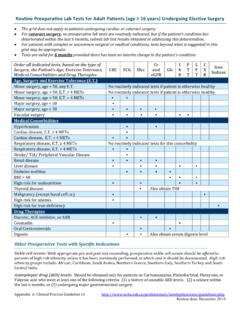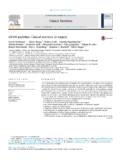Transcription of Perioperative Care for People with Diabetes Mellitus ...
1 Guideline for Perioperative Care for People with Diabetes Mellitus Undergoing Elective and Emergency SurgeryMarch 2021| 1 Guideline for Perioperative Care for People with Diabetes Mellitus Undergoing Elective and Emergency SurgeryDiabetes Guideline Working GroupPlease see below a full list of contributors to this guidance and their organisational affiliations. We would like to thank the following members of the Centre for Perioperative Care Diabetes Guideline Working Group for their valuable contribution to the drafting of this Goher AymanPatient representativeProfessor Ketan DhatariyaJoint British Diabetes Societies (JBDS)
2 For Inpatient Care GroupDr Jugdeep DhesiCentre for Perioperative Care Deputy DirectorProfessor Dileep LoboRoyal College of Surgeons of England Ms Agnes GrajaRoyal College of Nursing Diabetes Forum Steering Group Committee Professor Mike Grocott Centre for Perioperative Care Dr Clare HamblingPrimary Care Diabetes Society Ms Andrea LakeRoyal College of NursingDr Nicholas LevyRoyal College of Anaesthetists Dr Philip Newland-JonesUnited Kingdom Clinical Pharmacy Association (UKCPA)Mr Simon O NeilDiabetes UKDr Helen ParrettiRoyal College of General PractitionersProfessor Gerry RaymanDiabetes UK, Get it Right First Time (GIRFT)Dr David SelwynCentre for Perioperative Care Director Ms Sarah TinsleyUnited Kingdom Clinical Pharmacy Association (UKCPA)Guideline reviewThis is version of this guidance document, published in March 2021.
3 Any updates made to this guidance will be reflected in the table below and included in subsequent publication8 March 2021 Date of review: March 2024 ISBN: 978-1-900936-25-5 2021 Centre for Perioperative Care (CPOC)Whilst the Centre for Perioperative Care has endeavoured to ensure that this document is as accurate as possible at the time it was published, it can take no responsibility for matters arising from circumstances which may have changed, or information which may become available enquiries in regard to this document should be addressed to the Centre for Perioperative Care, Churchill House, 35 Red Lion Square.
4 London WC1R 4SG020 7092 1500 | | and layout by the Royal College of Anaesthetists| 2 Guideline for Perioperative Care for People with Diabetes Mellitus Undergoing Elective and Emergency SurgeryForeword 3 Background 5 Recommendations for organisations 8 Recommendations for primary care teams 9 Recommendations for staff working in surgical outpatients 9 Recommendations for staff working in preoperative assessment services 10
5 Recommendations for staff delivering care during hospital admission for elective surgery 12 Recommendations for staff admitting People with Diabetes as emergency surgical admissions 13 Recommendations for staff in theatre and recovery 13 Recommendations for teams delivering postoperative ward care 14 Recommendations for safe and effective discharge and follow up 15 Recommendations for research 15 Recommendations for People with Diabetes and their carers and the staff engaging with them 16 Glossary and abbreviations index 16 Practical Resources1 Perioperative management of medications for Diabetes Guideline for Perioperative adjustment of Guideline for
6 Perioperative adjustment of non-insulin Diabetes medication before surgery2 Suggested scales for variable rate intravenous insulin infusion 233 Prevention of hypoglycaemia and treatment for looming hypoglycaemia and hypoglycaemia 254 Rescue treatment for Perioperative hyperglycaemia 275 A clinical guideline that facilitates the Perioperative use of continuous subcutaneous insulin infusion 28 APPENDIX 1 Roles and responsibilities of clinical lead for Perioperative Diabetes care in hospitals 35 APPENDIX 2 Factors to consider in the Perioperative management of People with Diabetes 37 APPENDIX 3 Perioperative blood glucose target zones 38 APPENDIX 4
7 Indications and use of VRIII 39 APPENDIX 5 Initial Diabetes management of the patient admitted as a surgical emergency 40 CONTENTS| 3 Guideline for Perioperative Care for People with Diabetes Mellitus Undergoing Elective and Emergency SurgeryFOREWORDThe Centre for Perioperative Care (CPOC), a cross organisational body, was established in 2019 to facilitate and promote delivery of quality Perioperative care.
8 Given this remit, CPOC is in a unique position to collate and develop, implement, and evaluate new guidelines to support delivery of Perioperative care. As a consequence CPOC was commissioned by the Academy of Medical Royal Colleges (AoMRC) to build on existing work to develop a whole pathway guideline on Perioperative care for People with Diabetes undergoing elective and emergency surgery. Delivering whole pathway, quality Perioperative care requires multicomponent intervention, with integration across primary, secondary and social care from the moment surgery is contemplated through to full recovery.
9 A multidisciplinary one team approach is necessary to deliver each component of the pathway; shared decision making (SDM); preoperative risk assessment and optimisation of physiological status, co-morbidities and syndromes; lifestyle modification to improve both surgical and long-term health outcomes; quality, targeted postoperative care including rehabilitation; proactive discharge planning; patient and carer involvement, education and empowerment. Delivering such an approach requires accessibility to and effective use of technology, underpinned by research and implementation science.
10 Perioperative care for People with Diabetes is particularly complex and deficiencies in current Perioperative pathways for People with Diabetes have been well As a result, several guidelines to support clinical care have been However, an implementation gap between recommended care and routine clinical practice persists. This may be a consequence of each guideline being written for specific professional groups; for example, guidelines for general practitioners focussing on community care, for preoperative assessment teams addressing immediate preoperative care or for anaesthetists describing intraoperative To overcome this siloed approach, this new guideline has been coordinated by CPOC, working with patient representatives and all stakeholders involved in the care of People with Diabetes undergoing surgery.





